DHS’s Small Vessel Cooperative Tracking, what’s your guess?
It’s amazing how the whole boating community can apparently miss information of great interest even though it’s in plain sight. Remember how we argued about possible Department of Homeland Security AIS mandates last March? Well, had anyone poked around the DHS’s interesting Small Business Innovation Research (SBIR) Program, we would have known that the government had already expressed a desire to get the small vessel tracking job done in a much more passive manner, even with benefits to us boaters!…
In November, 2010, the SBIR published a Solicitation for grant proposals on the following topic: “Small Vessel Cooperative Identification and Tracking (SVCT) and Noncooperative Vessel Imaging and Tracking (NVIT) Technologies.” The web page seen above still exists and you can download the whole Solicitation document there.
The strong inference of SVCT and NVIT is that DHS plans a two prong approach to monitoring small vessels, Cooperative and Noncooperative. And note that they define small vessels as everything under 300 gross tons, as larger vessels are already “tagged with” AIS. But note too that Class B AIS isn’t even mentioned in the topic details. This fits with what I reported on that AIS vs “liberty” thread last year; Homeland Security never saw AIS as a viable mandated small vessel tracking system, though they are anxious to sort out boats better than they can now. You can learn about the thinking on this over the years at DHS’s Small Vessel Security site, which is where I found the (bad) scenario worksheet below. There are so many ways bad guys could use boats to do harm!
At any rate, I’ve learned a lot about what happened with the SBIR solicitation. An unusually large group of forty-two companies submitted applications for a Phase I grant and three were selected. That means they got financing to refine their ideas and submit them to a team of “subject matter experts” and other DHS personnel. In fact I spent almost two hours on the phone this morning with a retired USCG SAR and security operations expert who was intimately involved in this process and he impressed the heck out of me with his technical knowledge and “out of the box” thinking.
Two of those Phase I award winners only offered NVIT (noncooperative vessel) solutions and folks who don’t like the idea of DHS tracking their boat may be pleased to know that neither was chosen for a Phase II grant. Essentially DHS does not see a passive low cost vessel tracking technology in sight yet. But that’s not to say that they aren’t already using high end NVIT in particularly vulnerable harbors. And anyone upset about recreational boat tracking really ought to look first at what other branches of government are up to, like the new two billion dollar NSA data center profiled in Wired. Does tracking your boat matter if NSA is already collecting all your data anyway, maybe even encrypted accounts?
What is truly interesting, I think, is the single SBIR idea that’s been selected for Phase II, which essentially means an extensive public beta test. It’s not time to detail it yet, but I can tell you that it’s a pure SVCT solution, with emphasis on cooperation. And I certainly hope to discuss it soon because I think it might be a real boating game changer. What could it be?
A lot of you have technical knowledge and innovative juice and you can download the details of the SVCT solicitation just like the winning company did back in late 2010. What’s your idea for a cooperative tracking technology which incorporates “one or more of the following capabilities” (the bold facing is mine)?
- Omnidirectional or large field-of-view query capabilities from the DHS platform.
- Ability to concurrently query/track multiple small vessel targets.
- Passive or otherwise low Size, Weight, and Power (SWaP) requirements for the small craft. Wide adoption of a notional voluntary system with small vessel operators will enhance its success.
- Technology capabilities which utilize or interoperate with existing DHS sensors, such as radar or other deployed EOIR systems. New or single-purpose equipment on the DHS platform should be minimized if possible.
- Expanded small-vessel data. In addition to the UID, it is desired that the system report the vessel name, class, registration information, country, etc. A configurable return may even provide current GPS location, origin, destination, etc.
- Extended range.
- Multisensor/multispectral systems operating in a wide range of environmental conditions.



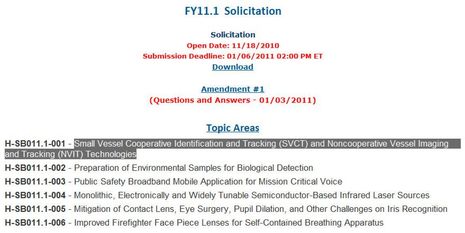
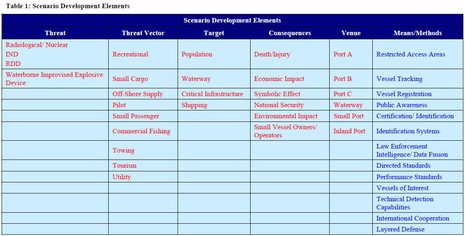
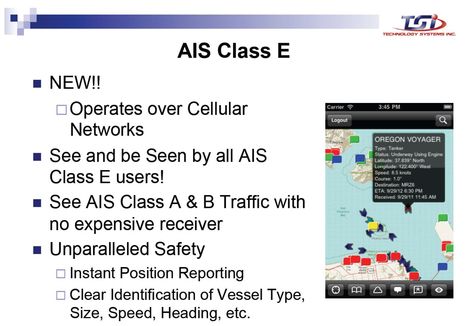
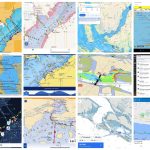
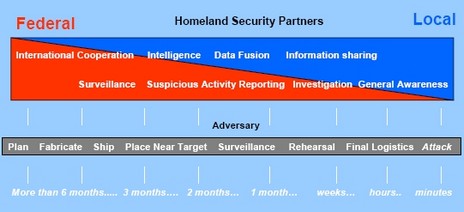
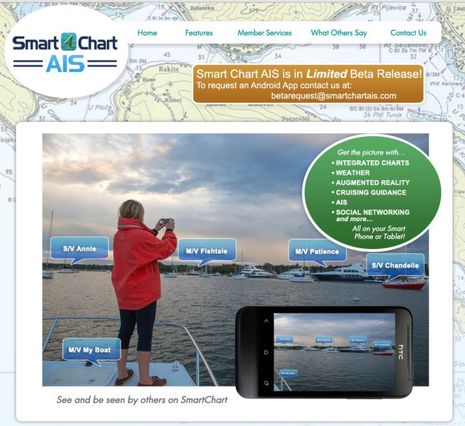








A hint: Another goal of the SBIR program, besides providing government with needed technologies, is to promote viable commercial business. In other words, a win-win for SVCT might be a product that was not only so attractive that many boaters would want it even if they had to somehow supply ID and location back to the government in exchange, but also a product that might generate income on its own.
Ben, Sometimes I think you like to make these kinds of posts just to stir the pot. You have to know that the tin foil hatters will spring to life on a subject like this. Forget the fact that the “cooperative solutions” outcome is preferred. I am still not sure how any or all of this can be accomplished without the input from either AIS or a system very similar. Since AIS is widely accepted in the recreational boating community, it would stand to reason that any new monitoring technology would incorporate it. Chuck
I plead Not Guilty, Chuck! I do like to break news, but this story was bound to come out sooner or later. That SBIR solicitation has been online at least since 11/18/2010.
Incidentally, the way I read it I’m already a cooperative SVCT boater since I run a Class B AIS whenever I’m underway. But Class B is still around $500 minimum before installation and many boaters don’t want to spend that money. I don’t think taxpayers are into picking up the cost either.
I’ve always figured that freely sharing my boat ID and track might mean that I was less likely to be boarded, and the gentleman I spoke with today confirmed that notion. While he made it clear that he can not speak for any government or military agency as he’s a civilian contractor now, he says the authorities are hungry for ways to identify and sort small boats. The way it is now “you often have to do a boarding to determine if you need to do a boarding.”
Just giving you hard time. I tend to agree with the comment on a Class B equipped vessel being less likely to be boarded. It seems to agree with my unofficial observation while cruising. It particular areas I have had boat owners with a Class B report that they were passed up for a boarding when another boat close by was stopped for inspection. We have been hailed from time to time, especially off the coast of Cuba, but never more than a radio conversation. We did have a Class B installed. Chuck
simplest thing to do would be use cellphone location data. they have the databases of vessel registrations. simply cross-reference the phone numbers and when the tracking system sees a cellphone “out in the water”, check to see if the owner of the cellphone matches someone in the vessel databases.
Heck, Mike, that might be happening already, though I’ve heard that the registration databases are pretty funky, and also incompatible state to state.
More important, that’s not a cooperative solution. I believe DHS looked for a system in which boaters explicitly agree to share their location and ID.
There are already amateur cooperative systems in place to track boats and ships using AIS. http://www.marinetraffic.com
I guess you could set up radar stations with volunteers, sort of like neighborhood watch groups, but hopefully without any munitions, but if the bad guys don’t want to participate, what do you do? They won’t use radar or cell phones (they know about emcon). Maybe they will install Class A AIS, and fake being a good guy.
I agree that this is a problem, but I can’t see any solution that is both effective and does not antagonize the boating public.
rxc, there’s already a rudimentary volunteer watch program called America’s Waterway Watch ( http://goo.gl/kXm17 ), which I mentioned when writting about this subject back 2008: http://goo.gl/jZxpg
Also, at least one government agency — and maybe two or more — are already have monitoring AIS along our coasts, probably much better than the amateur or commercial networks are. I don’t think DHS needs help with that!
“…he says the authorities are hungry for ways to identify and sort small boats.”
I wonder: would you and the rest of the sheep be as enthusiastic about attaching a transponder to your vehicle (besides the cell phone you already carry)?
I’m sure they’re also quite hungry to identify and sort motor vehicles, as well. In fact, I’ll bet they’d be just tickled to know who is where, and doing what at *all* times.
The Bill of Rights has become tin-foil, and demanding it be upheld is ridiculed. What a damned shame.
Well, there’s a fine example of the democratic spirit, dsp. If some of your fellow citizens don’t think that vehicle location is a guaranteed privacy right and that the government has a need to know it, they must be dumb animals!
I found what seems to be a reputable resource about the right of privacy and while it’s very interesting how it’s played into supreme court decisions, I see nothing there about the right to take a boat or similar anywhere you want:
http://law2.umkc.edu/faculty/projects/ftrials/conlaw/rightofprivacy.html
Did I miss something?
Yes, I’d say you did. This isn’t about “the right to take a boat or similar *anywhere you want*.”
It’s interesting that my assertion that I should be able to travel freely and privately on public roads and waterways without undue interference is translated as “you can’t just do whatever you want.”
Where I boat, there are many restricted areas; nuclear power plants, LNG facilities, locks, dams, etc. Should I enter one of these areas, the “authorities” have every right to investigate my presence there, be it by boarding or otherwise.
When I’m not in violation of the law, and no probable cause exists that I am in violation of the law, what I’m doing and where I’m going is no one’s business but my own.
What has been overlooked is: the Ninth Amendment simply lends strong support to the view that the “liberty” protected by the Fifth and Fourteenth Amendments from infringement by the Federal Government or the States is not restricted to rights specifically mentioned in the first eight amendments. Cf. United Public Workers v. Mitchell, 330 U.S. 75, 94-95.
You’re right, dsp, I didn’t phrase that correctly. I guess the privacy right you’re talking about is the right to go anywhere a boat can legally go without being identified or tracked. Obviously the government doesn’t recognize any such right and hasn’t for a long time. I can’t say I like it either, but I see the point. Maybe because another obvious and very-hard-to-secure soft target is the New York City subway system, which two of my children use nearly every day.
But you and bosunj are talking about general privacy issues that are in discussion, and litigation, all over the place. The real news in this thread is that DHS is hoping to sponsor a voluntary ID and tracking system so attractive that many boaters will want to use it. And it will obviously work better if cooperating boaters don’t necessarily want to help out DHS, but just want to get what the system offers.
Gentlemen like you can probably take some credit for “encouraging” DHS to go this route, but I doubt that a cooperative system will be subject to Bill of Rights interpretations. The interesting subject is what the cooperative system will look like, and whether it could work very well.
I wonder if its “The Right To Hide” that the tin foil helmet group are worried about. They must have some important secrets, or an embarrassing bodily feature. Paranoia smoke comes from -some- kind of a fire!
They fail to realize that everyone has been advertising their secrets and attitudes for thousands of years in the way they dress, in their body language, facial expression, and who they associate with. An unassuming store clerk can read a lot about a person and treat them accordingly.
On the subject of Paranoia, does anyone actually have a friend at DHS?
Sandy, Just because your paranoid, it doesn’t mean they aren’t out to get you. Chuck
Wonderful. Now just wanting to be left alone makes one a target of suspicion.
What a country we’ve become.
Maybe, over simplification, but seems a simple enough task to me. Forget AIS and Marine systems, have a GPRS modem, sending info via cell system. Security services already have the wherewithall to track via cell sites. Easy simple and cheap, because the infrastructure is already there. I’ll build it, if the US govmt is willing to give a British company a grant??!
Steve
Why would boaters volunteer to put one of those aboard, Steve?
“Now just wanting to be left alone makes one a target of suspicion.”
I’m not getting it, dsp. I don’t think any of us know how much our boats are being tracked because in fact tracking doesn’t effect us. You may think you’re being “left alone” because no one knows where you are, but how could you possibly know that?
I think I was first boarded by the Coast Guard in about 1978, just inside the mouth of Delaware Bay in late November. I don’t know if we were tracked on radar or just picked up visually. For all we know maybe there was acoustic monitoring of areas like that even then.
I also don’t know for sure if it was “suspicion” that motivated the “safety check”, though I don’t think the boarding party enjoyed those cold and rolly couple of hours any more we did. Plus I can see how three hairy guys on a 63-foot schooner that could have sailed there from anywhere might have looked suspicious!
In fact, we were delivering the boat from Newport to Annapolis while the staff and students who normally lived aboard were on Thanksgiving vacation. We’d even spent part of the previous night resting on an anchor in Cape May harbor. If the coastal watchkeepers had been tracking us — either cooperatively or passively — they could have seen that. And if they’d been maintaining a deep database of boat histories, they would have also known that this particular vessel made that late season passage annually. If they’d had that information don’t you agree that we might have been left alone?
Incidentally, the boat was the wonderful Alden schooner When and If, and apparently she’s still going strong:
http://www.mvgazette.com/article.php?27465
There are those who are comforted by a high degree of submissiveness to the authorities and they celebrate adherence to the traditions and social norms that are perceived to be endorsed by established authorities along with a belief that others should also be required to adhere to these norms.
Often there is a general aggressiveness (often passive) directed against others that are not of the same mind and therefore perceived to be targets according to established authorities.
Wow, might bosunj’s accusation of “general aggressiveness” be a projection, given the latest post on his blog?
http://bosunjbkk.wordpress.com/2012/01/16/duhmerica-the-insufferable/
Sorry, bosunj, but you’ve made your rage at most everyone and everything pretty clear. Please take it elsewhere.
Well, Ben, starting from the premise that if the security services of any government want to monitor you, they should pay for it, so one would assume that the cost to boaters should be minimal. It could be dressed up with a data package, which boaters could use as well. The big saving is in the infrastructure for the government…. it already exists, and is perfectly useable up to and beyond the territorial limit on 900/850Mhz.
I would also assume that it would be a matter of little import for a government to set up a M-M data scheme with one or more carriers. Location can be given in two methods, GPS input and Cell site triangulation.
Sensitive installations Nuke plants etc etc, could easily be set up with coverage if not existing, it makes sense. The other option which springs to mind, is a “squawk” transponder system similar to that used for aircraft, but would probably be a lot more expensive system to set up requiring more radar coverage than existing. They have some method or other in the UK already working, because if you get too close to a coastal nuclear power plant in a mobo, you are likely to have a RIB with four armed men in black chasing you off. They dont seem to bother about yachts, but fast motorboats spook them a fair bit.
A few years ago here the gov gave away free smoke detectors to every house in the country, I would think that with the number of boats being very significantly lower than the number of households per country, it should be do-able for any western nation. – Steve
Believing that if you don’t want to be tracked, you must have something to hide, is as absurd as believing that the first amendment means you’ll have something important to say. They are your rights, whether or not you have something to hide or something important to say.
These are rights that people fought and died for, they don’t need to be second guessed, gamed, questioned or characterized. They exist because the militant rebels (aka founding fathers) who destroyed property, terrorized citizens and ultimately established this country had lived under a government which did not grant them most of the rights in the Bill of Rights and they felt those rights were worth dying for (among a broad set of other things). It wasn’t some theoretical legal discussion. Give them away and it will a long time before they will be won back again.
That said, my guess is that the cheap, cooperative technology is DSC with a connected GPS.
Ben, great post, especially the Wired link, but I have been advised that I can’t comment any futh–
Some of you folks are making the tragic error of confusing privacy with anonymity.
We have lost our ability to be anonymous. It’s gone from the internet, it’s gone from public interactions.
You largely gave it away after 9/11 with the patriot act and all the associated bills.
Privacy has been whittled down to a very small footprint of the law, and its getting smaller.
Next time you apply for a job, don’t be surprised if your employer asks for passwords to your social media accounts.
That isn’t considered privacy either.
I’m intrigued by the cellphone idea. How would it work?
Ben, my response was to this nonsense:
“I wonder if its “The Right To Hide” that the tin foil helmet group are worried about. They must have some important secrets, or an embarrassing bodily feature. Paranoia smoke comes from -some- kind of a fire!”
Charming.
To your point, what your telling me is that because I can be watched and tracked electronically anyway, should just give up and get on board with voluntary identification and tracking, am I right?
Dsp, I agree with you and Russ that it’s absurd to assume that someone who doesn’t want to be tracked is guilty of something. Better yet, I think DHS agrees. They just want better tools to sort out what they see. Obviously some bad guys might try to game a cooperative tracking system and some good guys will not participate in it.
I’m not telling anyone to volunteer their ID and track, especially as the details of this new cooperative system aren’t out yet. However, I am trying to explain why I already volunteer my boat ID and location (via Class B AIS), and I will continue to question what exactly people think they’re “giving up” by not doing so. Do you think your boat is currently anonymous?
“Do you think your boat is currently anonymous?”
Of course not, and when did I ever claim that it was, or that I wanted it to be?
There’s that argument again–since I don’t currently have complete privacy or anonymity, I shouldn’t have have a problem with surrendering these things entirely, and I certainly shouldn’t *expect* them.
I yeild to DSP’s remarks. I wanted to point out that there has never been complete privacy, that the revered writers of our Constition accepted that without saying and made Intrusion a crime*. I personally consider Homeland Security a regrettable mistake that has accomplished little in exchange for serious harm and compromise of those very Constitutional Rights. Do you remember corner mail boxes? Walking all the way to the airplane with your shoes on? If the Terrorists’ aim was to stay in the conscience of the First World, and to put some fear in our lives, they have won, and DHS has helped them, and made life even worse for moderate American Muslims.
*except, of course, telephone solicitation and spam.
Apparently, neither consistently bad histories of overarching power and surveillance by governments, nor, the persistent timeless warnings by great men will ever discourage us from opposing the next initiative to more tightly control us.
“The prospect of a Government that treats all its citizens as criminal suspects is more terrifying than any terrorist. And even more frightening is a citizenry that can accept the surrender of its freedoms as the price of freedom.” Joe Sobran
“The ideal Government of all reflective men, from Aristotle onward, is one that lets the individual alone – one which barely escapes being no government at all.” H. L. Mencken
“Your silence gives consent.” Plato
“Patrick Henry did not say ‘Give me absolute safety or give me death’.” John Stossel
“Always love your country – but never trust your Government.” Robert Novak
“When one gets in bed with the Government, one must expect the disease that it spreads.” Ron Paul
“Things in our country run in spite of our Government, not by aid if it.” Will Rogers
“Paranoia is one thing, but to trust your Government is truly insane.” Joe Sobran
Seriously, Joe Sobran? ( http://goo.gl/fF7Ff )
Could we please discuss what SVCT might be?
Maybe there is an app for this. Something where a cooperative boater would register their boat, and connect their boat to a database real time on each voyage via their smartphone, participating in some safety net of trusted boaters that allows DHS to focus on the boats not participating as they seek to protect our coastline.
Maybe DHS could give back, with some functionality in the app that would provide for a burglar alarm (boat leaves harbor without owner), notification of severe weather approaching the boats position, a HELP or MOB function on the smartphone that would alert the closest voluntary boaters in the safety net that you are in distress, and point them to you without need of an MFD or remembering to turn up the volume on their VHF.
Best guess so far, Dan! Hope to share more details soon.
If a nation values anything more than freedom, it will lose its freedom; and the irony of it is that if it is comfort or money that it values more, it will lose that too.
— Somerset Maugham
Again I suggest that there are much bigger privacy concerns than boat tracking:
“Police Are Using Phone Tracking as a Routine Tool”
http://goo.gl/DR1ZG
If every small craft had an AIS CL”B” transmitting
all the time the monitoring station would be overloaded. These units are also slow to update.
What is required is a passive type of identification like the EZ-Pass with and RFID chip.
If attached to the vessel port and starboard (next to the registration number) and containing the MMSI number and/or registration number, concerned authorities or stationary readers could determine what vessel enters a restricted area etc.
This probably needs to be developed further, but would be better than being monitored agressively. This could also work for theft prevention at the marina. DHS, AIS and EPIRB all have their place in boating and should not be diluted with additional requirements.
Did you read the entry, Westwind? It doesn’t seem like DHS is going to require anything. So the question is why would boaters voluntarily paste RFID chips onto their hulls? What will be the incentive to install any hardware? (Also, if you read the SVCT solicitation, it says that RFID tags “may have a limited range versus other possible technologies…”)
Good quotes all, Don; but you missed my favorite. The following has been a standard part of my e-mail signature since late 2001:
“They that can give up essential liberty to obtain a little temporary
safety deserve neither liberty nor safety.”
— Benjamin Franklin, ‘Historical Review of Pennsylvania’, 1759
Mu best guess on this is something like the CG66 scheme operating in the UK.
http://www.dft.gov.uk/mca/mcga07-home/emergencyresponse/mcga-searchandrescue/cg66.htm
Here’s your ‘friendly’ DHS at work! Tin-foil hat? I think NOT!
http://cruisersnet.net/border-patrol-performing-searches-at-mobile-bay-marinas/
So I guess it doesn’t matter what the border patrol might have been looking for, given that you view all of us Americans as “a..holes” anyway?
http://bosunjbkk.wordpress.com/
Wow. Just wow…
As a kid growing up in a different land I used to look at the USA as “the land of the free”. What happened? How on earth can folks be so passive about having their locations and every movement tracked? How can people accept that – and why on earth would you want to?
Democracy – here’s what we should do – wanna vote on it?
Socialism – here’s what we’re going to do, and we’ll all do it together – it’s for the better. Wanna vote on it?
Communism. Here’s what we’re going t to. It’s a good idea – trust me. And yes – we’re going to do it – in fact, it’s done.
You tell me where “tracking small vessels” fits in the above scenarios. The very fact they the term “uncooperative” is actually used in titling one of the options speaks volumes…
As I said…wow. Just wow….
Where do you live, Nikko? I think you’re confusing freedom with privacy, but if you claim an inalienable right to privacy even when you’re out in public, I think you have a problem with just about every democracy on earth, let alone the other countries.